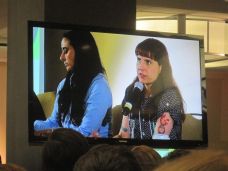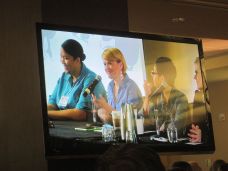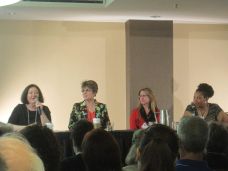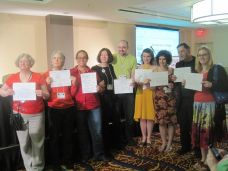This past weekend, I was in Washington, D.C. for the second Women in Secularism conference, sponsored by the Center for Inquiry. As promised, here’s my report.
I was expecting the conference to be overwhelmingly attended by women, but I was pleasantly surprised that there was only a slight majority of women over men, maybe 55-45 or 60-40. That could just be a consequence of the fact that men generally outnumber women in the secular movement, but I don’t think so, since I’m told the first WiS conference was overwhelmingly female-attended. I think it’s more likely that greater numbers of men are starting to recognize the importance of feminism in atheist activism, which is a very encouraging sign.
Probably my single favorite part was the Women Leaving Religion panel, which took place at the brutally early hour of 8:30 on Saturday morning. But it was worth getting out of bed to see Jamila Bey, Vyckie Garrison, Teresa MacBain, and Maryam Namazie – four whip-smart deconverts from a broad spread of religious backgrounds – talk about their conflicts with family and community, how they got out, and what kinds of new homes they found in the secular community. (Bey’s extended family represents a hodgepodge of churches, but all of them agreeing on the vital importance of religion in the black community; Garrison, who has seven children, is a former member of the “Quiverfull” Christian patriarchy cult; MacBain is a former Methodist minister who outed herself as a nonbeliever on stage at an American Atheists convention; and Namazie is the Iranian-born head of the Council of Ex-Muslims of Britain.)
But there was so much else that made an impression on me, like Susan Jacoby and Jennifer Michael Hecht discussing forgotten aspects of secular history. Jacoby talked about the great American infidel Robert Ingersoll, and how his (extremely progressive for his day) views on women’s equality guided and influenced his activism to an extent not seen before or since in any prominent male atheist. Hecht spoke about the first French translator of the Origin of Species, Clémence Royer, who took it upon herself to insert a long prologue praising the atheistic implications of Darwin’s theory. She later became friends with the pioneering neurologist Paul Broca and joined his Society of Mutual Autopsy, one of the first real scientific attempts to understand the workings of the brain.

Soraya Chemaly and Amanda Marcotte, from the panel on how women’s concerns can best be advanced as part of the secular agenda.
Maryam Namazie (whom I’ve wanted to meet in person for a while) gave a barnburner solo speech about the hideous persecution still faced by women and freethinkers throughout the Islamic world. It culminated with all the audience making signs to hold up for a group photo, in a show of solidarity with the Moroccan atheist Imad Iddine Habib, who bravely outed himself in this way even after his country’s ruling theocratic council declared that apostasy from Islam should be punishable by death.
Besides all that, there are a few more people whose talks I want to praise. Katha Pollitt gave a wide-ranging and eloquent historical perspective on whether religion and sexism will ever be disentangled. The badass Amanda Marcotte made an airtight case for why the interests of feminists and of atheists converge in the political sphere. And most of all, I want to single out CFI’s Debbie Goddard for recognition. She didn’t have a solo talk of her own, but she was on several panels and enlivened all of them. There’s a keen intelligence and a shrewd diplomatic understanding behind her cheerfully mild demeanor, and I fully expect her to be the head of this organization one day.

Debbie Goddard, Carrie Poppy, Desiree Schell and Greta Christina on what the secular movement can learn from other progressive social movements.
As I’ve previously mentioned, there was some unpleasantness at the opening of the conference, and it’s true that Ron Lindsay’s ill-advised remarks were a frequent topic of conversation throughout the weekend. If anything, they served as an illustration of why this conference was so necessary: besides the obvious target of religions that hate and demonize women, there are still too many leaders in the secular movement who just don’t get it.
But, at least for me, there were too many amazing panels and too many friends in attendance for that to spoil an otherwise phenomenal weekend. CFI assembled a top-notch speaker lineup, planned a schedule so compelling I didn’t want to miss a single talk, and kept the conference running smoothly from start to finish. Melody Hensley, the executive director of CFI-DC, stayed cool under pressure and gave a much better welcome to all the attendees at the Friday night reception.
If there’s a Women in Secularism 3, as I fully expect there will be, you’d better believe I’ll be there. If you missed this one, you owe it to yourself to be there too!

